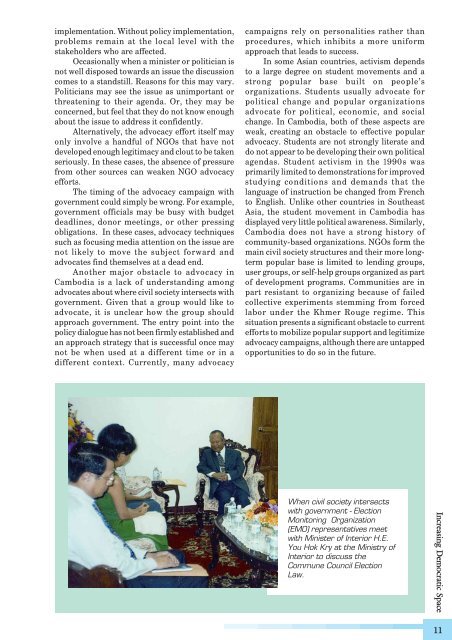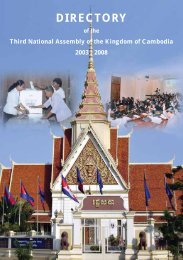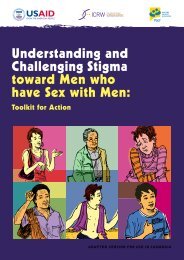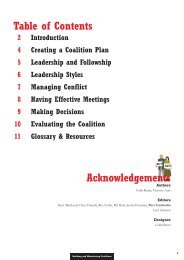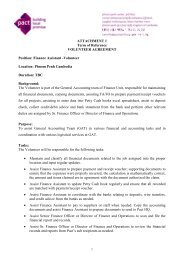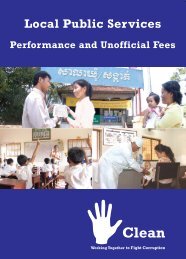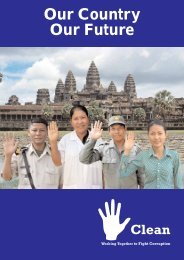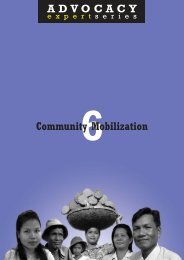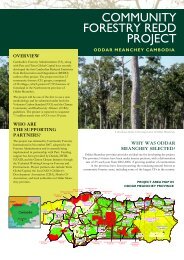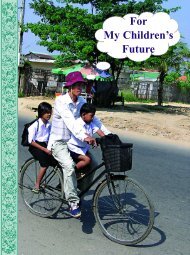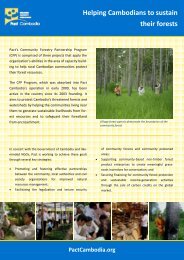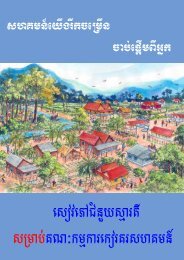Advocacy in Cambodia: Increasing Democratic ... - Pact Cambodia
Advocacy in Cambodia: Increasing Democratic ... - Pact Cambodia
Advocacy in Cambodia: Increasing Democratic ... - Pact Cambodia
Create successful ePaper yourself
Turn your PDF publications into a flip-book with our unique Google optimized e-Paper software.
implementation. Without policy implementation,<br />
problems rema<strong>in</strong> at the local level with the<br />
stakeholders who are affected.<br />
Occasionally when a m<strong>in</strong>ister or politician is<br />
not well disposed towards an issue the discussion<br />
comes to a standstill. Reasons for this may vary.<br />
Politicians may see the issue as unimportant or<br />
threaten<strong>in</strong>g to their agenda. Or, they may be<br />
concerned, but feel that they do not know enough<br />
about the issue to address it confidently.<br />
Alternatively, the advocacy effort itself may<br />
only <strong>in</strong>volve a handful of NGOs that have not<br />
developed enough legitimacy and clout to be taken<br />
seriously. In these cases, the absence of pressure<br />
from other sources can weaken NGO advocacy<br />
efforts.<br />
The tim<strong>in</strong>g of the advocacy campaign with<br />
government could simply be wrong. For example,<br />
government officials may be busy with budget<br />
deadl<strong>in</strong>es, donor meet<strong>in</strong>gs, or other press<strong>in</strong>g<br />
obligations. In these cases, advocacy techniques<br />
such as focus<strong>in</strong>g media attention on the issue are<br />
not likely to move the subject forward and<br />
advocates f<strong>in</strong>d themselves at a dead end.<br />
Another major obstacle to advocacy <strong>in</strong><br />
<strong>Cambodia</strong> is a lack of understand<strong>in</strong>g among<br />
advocates about where civil society <strong>in</strong>tersects with<br />
government. Given that a group would like to<br />
advocate, it is unclear how the group should<br />
approach government. The entry po<strong>in</strong>t <strong>in</strong>to the<br />
policy dialogue has not been firmly established and<br />
an approach strategy that is successful once may<br />
not be when used at a different time or <strong>in</strong> a<br />
different context. Currently, many advocacy<br />
campaigns rely on personalities rather than<br />
procedures, which <strong>in</strong>hibits a more uniform<br />
approach that leads to success.<br />
In some Asian countries, activism depends<br />
to a large degree on student movements and a<br />
strong popular base built on people’s<br />
organizations. Students usually advocate for<br />
political change and popular organizations<br />
advocate for political, economic, and social<br />
change. In <strong>Cambodia</strong>, both of these aspects are<br />
weak, creat<strong>in</strong>g an obstacle to effective popular<br />
advocacy. Students are not strongly literate and<br />
do not appear to be develop<strong>in</strong>g their own political<br />
agendas. Student activism <strong>in</strong> the 1990s was<br />
primarily limited to demonstrations for improved<br />
study<strong>in</strong>g conditions and demands that the<br />
language of <strong>in</strong>struction be changed from French<br />
to English. Unlike other countries <strong>in</strong> Southeast<br />
Asia, the student movement <strong>in</strong> <strong>Cambodia</strong> has<br />
displayed very little political awareness. Similarly,<br />
<strong>Cambodia</strong> does not have a strong history of<br />
community-based organizations. NGOs form the<br />
ma<strong>in</strong> civil society structures and their more longterm<br />
popular base is limited to lend<strong>in</strong>g groups,<br />
user groups, or self-help groups organized as part<br />
of development programs. Communities are <strong>in</strong><br />
part resistant to organiz<strong>in</strong>g because of failed<br />
collective experiments stemm<strong>in</strong>g from forced<br />
labor under the Khmer Rouge regime. This<br />
situation presents a significant obstacle to current<br />
efforts to mobilize popular support and legitimize<br />
advocacy campaigns, although there are untapped<br />
opportunities to do so <strong>in</strong> the future.<br />
When civil society <strong>in</strong>tersects<br />
with government - Election<br />
Monitor<strong>in</strong>g Organization<br />
(EMO) representatives meet<br />
with M<strong>in</strong>ister of Interior H.E.<br />
You Hok Kry at the M<strong>in</strong>istry of<br />
Interior to discuss the<br />
Commune Council Election<br />
Law.<br />
Increas<strong>in</strong>g <strong>Democratic</strong> Space<br />
11


